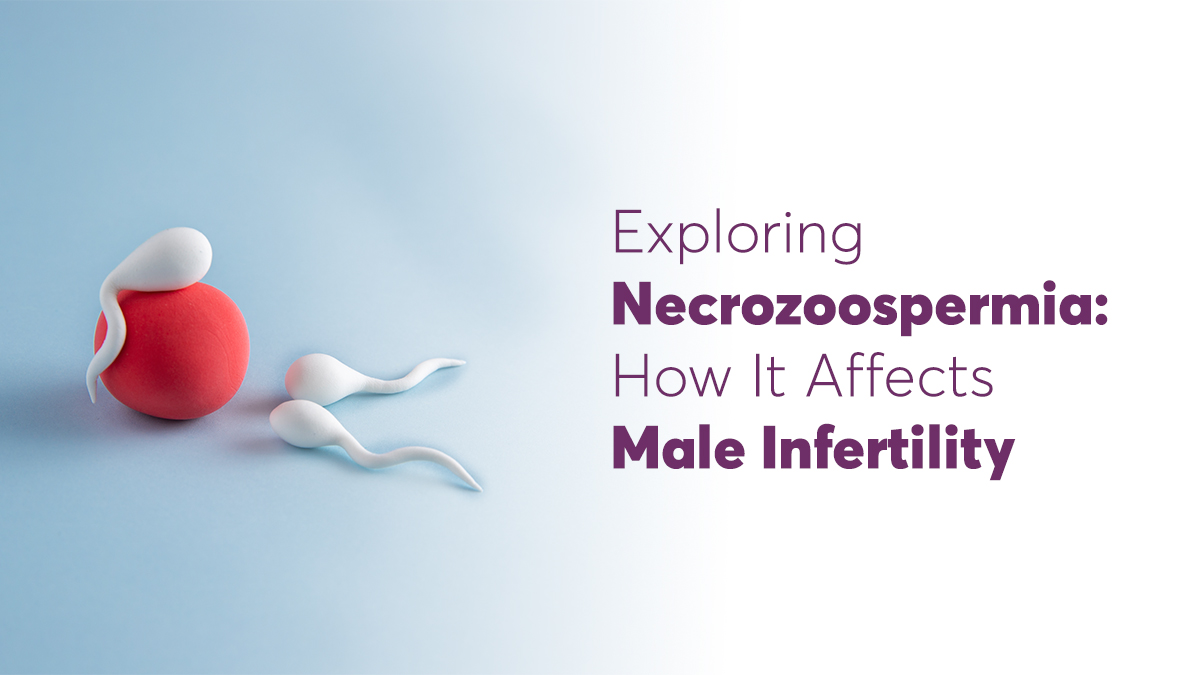Millions of couples suffer from fertility issues worldwide. This challenge is not gender specific and affects both men and women. Male infertility accounts for almost half of all cases in couples who are struggling to get pregnant. It stems from numerous factors that affect sperm production, quality and function, resulting in difficulties in fertilising an egg. The complexity of male fertility arises from the intricate processes involved in sperm development and health, all of which are prone to disruption by genetic, environmental, hormonal and lifestyle factors.
What is Necrozoospermia?
One of the conditions of male infertility is Necrozoospermia. It occurs when a large quantity of sperm in a sperm sample is found to be non-motile or dead, thereby decreasing the probability of successful fertilisation and pregnancy; unlike other sperm abnormalities, like asthenozoospermia, where motility declines, but some movement is still there, or teratozoospermia, which entails abnormal sperm shape – Necrozoospermia is characterised by a huge proportion of immotile and non-viable sperm. This considerably affects fertility, thereby presenting bigger challenges for natural conception as opposed to other sperm-related conditions.
Causes of Necrozoospermia
Some of the common causes of Necrozoospermia include:
Testicular Factors:
Conditions impacting the testicles, like testicular trauma, infections, testicular torsion or previous surgeries, can harm sperm production and quality, thereby resulting in Necrozoospermia.
Genetic Factors:
Genetic abnormalities or mutations can impact sperm viability and function, resulting in Necrozoospermia. These genetic conditions have a high likelihood to impact sperm production, maturation or motility, adding to the appearance of non-viable sperm cells in semen samples.
Environmental Factors:
Exposure to environmental toxins, chemicals, radiation or specific medicines can damage sperm production and quality, leading to Necrozoospermia. Lifestyle factors like smoking, illicit drug use, and excessive alcohol consumption can also negatively affect sperm health and add to Necrozoospermia.
Infections:
Specific infections like sexually transmitted infections (STIs) or reproductive tract infections can impair sperm cells and damage their viability, resulting in Necrozoospermia. Inflammation or scarring of the reproductive tract owing to infections can also impact sperm production and quality.
Systemic Conditions:
Underlying medical conditions like diabetes and autoimmune disorders can affect sperm health and lead to Necrozoospermia. Hormonal imbalances or deficiencies, like low testosterone levels, can also impact sperm quality and production.
Idiopathic Causes:
In a few cases, the exact cause of Necrozoospermia may not be detected and the condition may be catergorised as idiopathic. Idiopathic Necrozoospermia refers to cases where no underlying cause can be found even though thorough testing and assessment is performed.
Symptoms of Necrozoospermia
Necrozoospermia generally does not have any noticeable symptoms. The primary indication is the existence of non-motile and non-viable sperm while conducting a semen analysis. Couples facing challenges in getting pregnant might have to go through fertility testing, where Necrozoospermia can be identified.
Diagnosis of Necrozoospermia
How is male infertility evaluation conducted? Necrozoospermia can be diagnosed via a semen analysis, also referred to as a sperm count test. During this test, a sample of semen is gathered and assessed under a microscope to evaluate the concentration, motility and morphology of the sperm. If a considerable portion of the sperm is found non-viable or immotile, then Necrozoospermia is detected.
How Necrozoospermia Affects Male Fertility
Necrozoospermia considerably affects male fertility owing to the high proportion of dead or non-motile sperm, which significantly reduces the probability of fertilisation. Sperm motility is vital for reaching and penetrating the egg. In Necrozoospermia, the sperm don’t have the capability to move or swim efficiently, thereby making it challenging to conceive naturally.
The presence of mostly non-viable sperm might signify that even if the sperm reaches the egg, their poor quality decreases the probability of a successful fertilisation. Due to this, couples may face challenges to conceive naturally, often needing assisted reproductive techniques such as intracytoplasmic sperm injection (ICSI), where one healthy sperm is directly injected into the egg. However, the success of the treatments relies on the underlying cause of Necrozoospermia, which may include genetic factors, exposure to harmful substances or infections.
Treatment Options for Necrozoospermia
The way Necrozoospermia is treated depends on its type and cause. Some of the male infertility treatments comprise of:
Lifestyle Changes:
If you lead a healthy lifestyle, including consuming a balanced diet, regular exercise and avoiding toxins, it can enhance sperm quality.
Surgery:
Surgical procedures can be performed to treat conditions such as varicocele or eliminate obstructions in the reproductive tract.
Hormonal Therapy:
Hormonal treatments can be utilized to deal with hormonal imbalances impacting sperm production.
Assisted Reproductive Techniques (ART):
Methods like ICSI or IVF can overcome issues due to Necrozoospermia by directly injecting capable sperm into an egg for fertilisation.
Coping with Necrozoospermia
Emotional and mental health support is important for dealing with the psychological challenges related to infertility issues like Necrozoospermia. Feelings of anxiety, depression, and inadequacy are common. This is why it will immensely help to discuss your issues with a counsellor or join a support group that can provide emotional support. If you can connect with others who have gone through similar challenges, it can offer a sense of community, decrease feelings of isolation and deliver new perspectives on coping.
When to Seek Medical Advice
Medical advice is suggested if a couple has been trying to get pregnant for a year without success or six months if the female is older than 35, as male fertility issues such as Necrozoospermia could also be present. Early diagnoses can help detect causes and offer timely treatment options, thereby boosting the chances of conception.
Related Read: How to Know if You Need a Male Fertility Check
Conclusion
Necrozoospermia is a condition that can hurt fertility. You can approach Oasis Fertility to discuss your fertility issues with our experts, as they are equipped with the right skills and tools to detect the condition and ensure timely treatment as well as offer advice on improving sperm health and sperm motility issues. You should visit an Oasis Fertility Clinic near you near you immediately. You can also contact 1800-3001-1000 or express your concerns on the live chat for prompt assistance.

